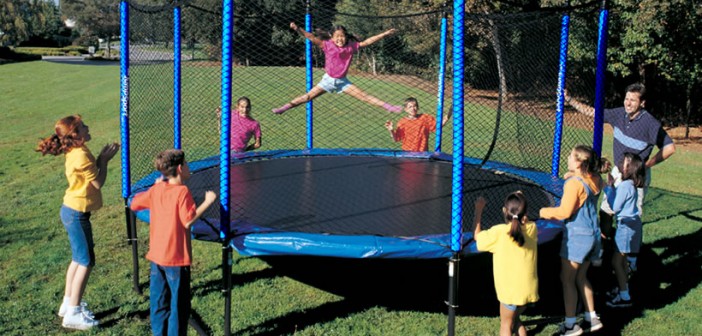Trampolines have been a popular fixture in backyards for many years, and today they are also popular pieces of exercise equipment. However, pediatric authorities often publish recommendations against owning a trampoline. There are ways to enjoy the physical and mental health benefits of the equipment. The first step is to recognize the potential for danger and injury. Once you’ve accepted the possibility of injury and the need for reasonable precautions, you can begin to put important safety prevention methods into practice.
Step One: Understand the Need for Safety
It’s common for children to get hurt when they land wrong while playing or trying stunts, when they jump into each other, or when they fall off of the trampoline. Sixteen years old is the average age of persons who obtain injuries that result from trampolines, much higher than all other ages. A possible explanation for this is that teens tend to jump higher and with more force. This should be a warning for adults using trampolines as well; their added weight and muscle strength could also lead to serious injuries even if they are less impulsive than children and teens.
Step Two: Inspect the Equipment
You may want to start with the springs. Check to be sure that there are no missing springs and that they are all attached securely. Cover the springs with padding to prevent children from slipping between the springs, and on mini-tramps to keep feet from getting caught in the spaces. From there, move on to inspect the mat. Holes and frayed areas cannot be fixed with duct tape. The weakened areas will change the way that the trampoline responds when it’s used. For large trampolines that are kept outside, take steps to keep the equipment free of debris and on level ground. Repair or replace any parts that become damaged.
Step Three: Establish Rules for Using the Trampoline
The manufacturer’s instructions should be carefully followed during the assembly and use of the equipment. Statistics show that most trampoline injuries take place when more than one person is using the equipment at the same time. Enforce a rule that just one person will use the trampoline at a time. Other rules could include limiting the performance of flips and stunts, keeping balls and other items off the equipment, preventing anyone from going under the trampoline, and restricting the use of alcohol or drugs while on the trampoline. Naturally, these safety rules could apply to a mini-tramp being used for exercise, as well.
Step Four: Provide Supervision to Enforce the Rules
Parents can enforce the rules when they watch their children using the equipment. This is probably the best way to prevent horseplay, stunts, and other rule-breaking activity. Even older children should be supervised. Adults using the mini-tramp for exercise might also want to use the equipment with a partner present.
Step Five: Consider the Use of a Net
In the absence of a net, children should stay as close to the center of the mat as possible. Even under supervision, however, it can be difficult to keep bouncing under control. The combined safety of a net and a watchful parent can go a long way toward keeping the backyard trampoline a fun and appropriate place to play.
Keep It Safe
There are a number of health benefits available for children and adults using trampolines. Keep the risks of injury low and protect those benefits by putting important safety rules into place and then enforcing those rules.




